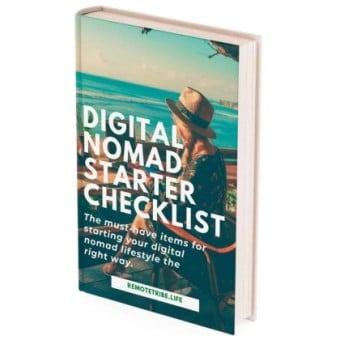Traveling as a digital nomad is fun and fullfiling. Most of the travellers are very active young people with the age between 25-35 years old. This is a beautiful age where one doesn’t have necesarily have big medical issues. However, accidents can happen whilst abroad and the truth is we, as avid travellers, don’t care so much about the medical system in that country, but mostly about the experiences, local culture and work-life balance.
To be one the safe side, it is always a great idea to have a travel insurance, but most importantly a health insurance. Having a good medical (and sometimes travel) insurance is A MUST when travelling to be worry free, covered and just enjoy the local country without worrying too much. This will save you a LOT of headaches and money
It doesn’t necesarily have to be a special insurance for digital nomads, but you might find some advantages if you choose the dedicated one.
There are a few big names in the digital nomad health insurance sector. The most popular are SafetyWing and World Nomads. There is a new promising player in town called Insured Nomads who’ve put together a great team to build a strong international insurance for world nomads.
We sat down with Andrew Jernigan, the CEO and Co-founder of Insured Nomads to find out more about their nomad health insurance as well as why you must get one whilst travelling.
We hope you’ll enjoy!
Hi Andrew,
Thanks for joining us at Remote Tribelife. We are happy to have you feature in our digital magazine for remote workers and digital nomads.
RTL: Can you tell us a bit about yourself ?
Andrew: I’m a blend between a creative and a connector, a researcher and inventor, protector and dad. Twenty years ago (this month) I set out with my Dell laptop (now writing this on my MacBook Pro). I left for the UK and spent half the year there, went back home to sell all my belongings and then went to Brazil. Not too long after I married (together committed to live anywhere) and have worked around the world with my wife and three kids (and even have taken our cat and dog with us at various times). My wife, Juliana is one of the founders of Insured Nomads, and is a pure genius and solid as a rock global warrior. Three third culture kids (TCK) that have weathered the world well.
RTL: Great. I assume you are a bit of a digital nomads yourself. Where are you based right now and why do you enjoy it?
Andrew: Yes, I’m quite nomadic actually. Since January 2020 I’ve been based in Rio de Janeiro, Brazil. Last year I spent six months last year in Belo Horizonte, Brazil; along with time in France, Germany, Switzerland and the USA.
I so enjoy laid-back, refined life in Rio de Janeiro, but outside the bubble of the city centre/Zona Sul region, being based in Barra da Tijuca (neighborhood/bairro). The outstanding dining, nature, beaches and mountains, shopping and ease of life in suburban Rio de Janeiro is quite different from the perception of the tourist/quicker visit experiences in Rio.
RTL: How did “Insured Nomads” insurance come into existence?
Andrew: A group of us formed Insured Nomads to create the needed solutions for the globally mobile. Getting the licensure and regulatory approvals, underwriters, alarm/response centre, technology partners, and key people in place were key elements in the first season.
We have a stellar group of founders, executive management, team members around the globe that are committed to bringing solution partners from around the world into our offering so that we are the leading provider of insurance for the international lifestyle.
RTL: What is a “Nomadic” health insurance and how does it differ from a normal insurance?
Andrew: Nomad means wanderer, and it’s often characteristic of a mindset of one who is at home somewhere other than their passport country, much different than the mindset of a traveler. Insurance for the nomad also differs from insurance for the traveler. Travel insurance is for the one going on a trip, while a different set of risk is in play for the one who has chosen a lifestyle away from their home country. Travel insurance is for the experimenter that will go back home quite soon where they have coverage in place, while the insurance for the nomadic lifestyle needs to have a long-term strategy in mind, not trip based.
Nomadic people need insurance that will cover them for years to come, so it’s international insurance not travel insurance. Policies that will cross-borders and will still be in place for years to come (int’l health, cross-border term life insurance, int’l income protection/disability, etc).
Since many think of travel insurance being the policy to purchase it is crucial to point out that it covers a set period of time excluding anything that occurred before the policy started, and once it ends you can purchase a new policy and anything is again excluded from before. Although, an international health insurance policy, which is the wise choice for nomads, has the primary advantage of covering occurrences/illnesses in the future when the policy is renewed. You spend money on what you value – value yourself and invest in your insurance – health, life, income protection.
Why would a remote worker living abroad need this type of insurance?
Andrew: Our health is unpredictable. Seven years ago I was in and out of different countries, working out and fit, and suddenly I had a heart attack and then open-heart surgery – almost died. Luckily it happened when I was in a place with good hospitals and I had insurance to cover that six-digit expense. Not too long before I had been in a remote, small town in sub-Saharan Africa where there would not have been a way to operate. Sure, you’ve been healthy this long, but guard against the financial risk of a major diagnosis or medical evacuation and care.
Time after time, over the years, I’ve seen unexpected deaths where the nomad didn’t leave a penny to those he loved and they basically had to do a crowdfunding drive to have money for the next season, pay medical bills and survive. Get the basic life insurance to care for those you love, even if they are not in your life yet.
One aspect that is often not discussed is income protection, a policy that will pay you monthly if you cannot perform your role any longer. For example, if your hands were damaged in an accident and you can no longer do the same type of work then you would get a monthly amount deposited to you. Remote workers/digital nomads should consider this.
RTL: There are several types of insurances on your website. Which one would you recommend for our audience, digital professionals with the age between 25-35 years old?
Andrew: If you are just stepping out for a short season out of your home country, then a World Explorer Flex travel insurance plan (it’s a build-your-own format policy with add-ons, and adjustments on levels of benefit.
If you are planning on a lifestyle for a few years, then get the Nomad Health Insurance plan, Primary level if you want just catastrophic (cancer, major medical, etc) as it is for when you are admitted to the hospital and Primary Plus for full coverage, or Select if you want all the possible features (such as maternity if eventually you want to cover birth/birth complications/newborn care). It’s by region of the world vs country. Your address outside your passport country can be an Airbnb or hostel, so it’s ideal for the unknown locations of a region you choose.
Certainly lock in cross-border term life insurance while you are 25-35 years old as it’s VERY low priced now compared to later when older and have had diagnoses/health issues.
Subscribe to Our Newsletter
RTL: I know your organisation is very focused on technology. How do you integrate technology in your product and why is it at the core of your company?
Andrew: Digital transformation and implementation is a constant for Insured Nomads so that we can provide the services that complement the payment of medical bills. We operate knowing that insurance is the body of the vehicle, while innovation, service and our people are the core/engine to drive the many other things that we feel are crucial for keeping in step with how we would like to be served, so building it in so our clients are served by these means.
RTL: Can you give us a glimpse in the future development of the offering and product?
Andrew: Our next addition is providing easy access to your policy information through a pass to add to your Apple Wallet (phone/ipad/watch) and GooglePay wallet in Android devices. Next will be the deployment of our GlobalInstaPay technology where member id card that can be swiped through the Visa/Mastercard network to pay the claim and instant reimbursement through our new app is in development, along with policy information in your Apple Wallet/GooglePay Wallet.Our first AI integration is in the works to assist with wellbeing and personal health – which is a passion of our team having lived around the world and faced the stresses of life on the journey.There is more, but that is a good ‘glimpse’.
RTL: How does “Insured Nomads” differentiate itself from the competition then? Gives us a few reasons why people would choose your company against the competitors.
Andrew: Beyond the differentiators that we have mentioned today, it’s our people and the service we are committed to providing through phone, chat, messaging services, and social media to ensure you can get your questions answered.
RTL It seems like the Insurance Industry for young digital nomads it’s increasing. Is that true and if so why? How do you see this niche developing over the next few years?
Andrew: The niche will grow, but often by marketing the same type products that have always been sold but using social media to achieve sales growth without backing it with innovation.
The market has had some new entrances in the last couple of years, but we will probably see exits as well since travel insurance is a saturated market with weak products, and international health insurance is dominated by those who are surviving on multinational corporate accounts which will use remote worker/contract labor more in the future.
RTL: It’s been great to have you on our blog. Finally, a few fun questions for our audience. What’s your favourite country and why?
Andrew: It’s a tough answer to give since I’ve worked across five continents, and many countries. The winner is: (drum roll 🥁) Brazil 
RTL: Our audience might want to get insurance before they start travelling again. Where and how can they buy the insurance?
Andrew: Easy, go to www.InsuredNomads.com and chat with us first to get questions answered through WhatsApp, WeChat, Line, Telegram, Messenger or email: [email protected] and follow through your favorite social media: IG, Reddit, FB, Twitter, LinkedIn


